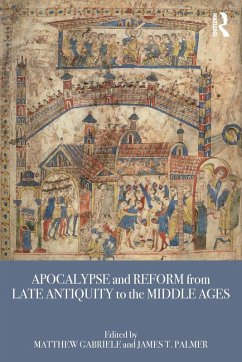Apocalypse and Reform from Late Antiquity to the Middle Ages
Herausgeber: Gabriele, Matthew; Palmer, James T.
Apocalypse and Reform from Late Antiquity to the Middle Ages
Herausgeber: Gabriele, Matthew; Palmer, James T.
- Broschiertes Buch
- Merkliste
- Auf die Merkliste
- Bewerten Bewerten
- Teilen
- Produkt teilen
- Produkterinnerung
- Produkterinnerung
Apocalypse and Reform from Late Antiquity to the Middle Ages provides the ideal introduction to what reformist apocalypticism meant for the formation of Medieval Europe, from the Fall of Rome to the twelfth century.
Andere Kunden interessierten sich auch für
![Travel, Pilgrimage and Social Interaction from Antiquity to the Middle Ages Travel, Pilgrimage and Social Interaction from Antiquity to the Middle Ages]() Travel, Pilgrimage and Social Interaction from Antiquity to the Middle Ages64,99 €
Travel, Pilgrimage and Social Interaction from Antiquity to the Middle Ages64,99 €![Infirmity in Antiquity and the Middle Ages Infirmity in Antiquity and the Middle Ages]() Infirmity in Antiquity and the Middle Ages42,99 €
Infirmity in Antiquity and the Middle Ages42,99 €![Humour, History and Politics in Late Antiquity and the Early Middle Ages Humour, History and Politics in Late Antiquity and the Early Middle Ages]() Humour, History and Politics in Late Antiquity and the Early Middle Ages50,99 €
Humour, History and Politics in Late Antiquity and the Early Middle Ages50,99 €![Donations, Inheritance and Property in the Nordic and Western World from Late Antiquity until Today Donations, Inheritance and Property in the Nordic and Western World from Late Antiquity until Today]() Donations, Inheritance and Property in the Nordic and Western World from Late Antiquity until Today64,99 €
Donations, Inheritance and Property in the Nordic and Western World from Late Antiquity until Today64,99 €![From the Brink of the Apocalypse From the Brink of the Apocalypse]() John AberthFrom the Brink of the Apocalypse59,99 €
John AberthFrom the Brink of the Apocalypse59,99 €![The Meaning of History The Meaning of History]() Nikolai BerdyaevThe Meaning of History71,99 €
Nikolai BerdyaevThe Meaning of History71,99 €![The Power of Religion in Late Antiquity The Power of Religion in Late Antiquity]() Andrew CainThe Power of Religion in Late Antiquity72,99 €
Andrew CainThe Power of Religion in Late Antiquity72,99 €-
-
-
Apocalypse and Reform from Late Antiquity to the Middle Ages provides the ideal introduction to what reformist apocalypticism meant for the formation of Medieval Europe, from the Fall of Rome to the twelfth century.
Hinweis: Dieser Artikel kann nur an eine deutsche Lieferadresse ausgeliefert werden.
Hinweis: Dieser Artikel kann nur an eine deutsche Lieferadresse ausgeliefert werden.
Produktdetails
- Produktdetails
- Verlag: Routledge
- Seitenzahl: 246
- Erscheinungstermin: 10. August 2018
- Englisch
- Abmessung: 234mm x 156mm x 13mm
- Gewicht: 380g
- ISBN-13: 9781138684041
- ISBN-10: 113868404X
- Artikelnr.: 52379282
- Herstellerkennzeichnung
- Libri GmbH
- Europaallee 1
- 36244 Bad Hersfeld
- gpsr@libri.de
- Verlag: Routledge
- Seitenzahl: 246
- Erscheinungstermin: 10. August 2018
- Englisch
- Abmessung: 234mm x 156mm x 13mm
- Gewicht: 380g
- ISBN-13: 9781138684041
- ISBN-10: 113868404X
- Artikelnr.: 52379282
- Herstellerkennzeichnung
- Libri GmbH
- Europaallee 1
- 36244 Bad Hersfeld
- gpsr@libri.de
Matthew Gabriele is Associate Professor and Coordinator of Medieval & Early Modern Studies in the Department of Religion and Culture at Virginia Tech, USA. His previous publications include An Empire of Memory: The Legend of Charlemagne, the Franks, and Jerusalem before the First Crusade (2011), The Legend of Charlemagne in the Middle Ages: Power, Faith, and Crusade (2008) and Where Heaven and Earth Meet: Essays on Medieval Europe in Honor of Daniel F. Callahan (2014). James T. Palmer is Reader in Medieval History at St Andrews, UK. His previous publications include The Apocalypse in the Early Middle Ages (2014) and Anglo-Saxons in a Frankish World 690-900 (2009).
Introduction; Chapter 1: "The Chronicle of Hydatius: a historical guidebook
to the last days of the Western Roman Empire"; Chapter 2: "To be found
prepared: eschatology and reform rhetoric ca. 570-ca. 640"; Chapter 3: "The
final countdown and the reform of the liturgical calendar in the early
Middle Ages"; Chapter 4: "Apocalypse and reform in Bede's De die iudicii";
Chapter 5: "Creating futures through the lens of revelation in the rhetoric
of the Carolingian Reform ca. 750 to ca. 900"; Chapter 6: "Eschatology and
reform in early Irish law: the evidence of Sunday legislation"; Chapter 7:
"Apocalypse, eschatology and the interim in England and Byzantium in the
tenth and eleventh centuries"; Chapter 8: "Apocalypticism and the rhetoric
of reform in Italy around the year 1000"; Chapter 9: "This time. Maybe this
time. Biblical commentary, monastic historiography, and Lost Cause-ism at
the turn of the first millennium"; Chapter 10: "Against the silence:
twelfth-century Augustinian reformers confront apocalypse"; Chapter 11:
Afterword
to the last days of the Western Roman Empire"; Chapter 2: "To be found
prepared: eschatology and reform rhetoric ca. 570-ca. 640"; Chapter 3: "The
final countdown and the reform of the liturgical calendar in the early
Middle Ages"; Chapter 4: "Apocalypse and reform in Bede's De die iudicii";
Chapter 5: "Creating futures through the lens of revelation in the rhetoric
of the Carolingian Reform ca. 750 to ca. 900"; Chapter 6: "Eschatology and
reform in early Irish law: the evidence of Sunday legislation"; Chapter 7:
"Apocalypse, eschatology and the interim in England and Byzantium in the
tenth and eleventh centuries"; Chapter 8: "Apocalypticism and the rhetoric
of reform in Italy around the year 1000"; Chapter 9: "This time. Maybe this
time. Biblical commentary, monastic historiography, and Lost Cause-ism at
the turn of the first millennium"; Chapter 10: "Against the silence:
twelfth-century Augustinian reformers confront apocalypse"; Chapter 11:
Afterword
Introduction; Chapter 1: "The Chronicle of Hydatius: a historical guidebook
to the last days of the Western Roman Empire"; Chapter 2: "To be found
prepared: eschatology and reform rhetoric ca. 570-ca. 640"; Chapter 3: "The
final countdown and the reform of the liturgical calendar in the early
Middle Ages"; Chapter 4: "Apocalypse and reform in Bede's De die iudicii";
Chapter 5: "Creating futures through the lens of revelation in the rhetoric
of the Carolingian Reform ca. 750 to ca. 900"; Chapter 6: "Eschatology and
reform in early Irish law: the evidence of Sunday legislation"; Chapter 7:
"Apocalypse, eschatology and the interim in England and Byzantium in the
tenth and eleventh centuries"; Chapter 8: "Apocalypticism and the rhetoric
of reform in Italy around the year 1000"; Chapter 9: "This time. Maybe this
time. Biblical commentary, monastic historiography, and Lost Cause-ism at
the turn of the first millennium"; Chapter 10: "Against the silence:
twelfth-century Augustinian reformers confront apocalypse"; Chapter 11:
Afterword
to the last days of the Western Roman Empire"; Chapter 2: "To be found
prepared: eschatology and reform rhetoric ca. 570-ca. 640"; Chapter 3: "The
final countdown and the reform of the liturgical calendar in the early
Middle Ages"; Chapter 4: "Apocalypse and reform in Bede's De die iudicii";
Chapter 5: "Creating futures through the lens of revelation in the rhetoric
of the Carolingian Reform ca. 750 to ca. 900"; Chapter 6: "Eschatology and
reform in early Irish law: the evidence of Sunday legislation"; Chapter 7:
"Apocalypse, eschatology and the interim in England and Byzantium in the
tenth and eleventh centuries"; Chapter 8: "Apocalypticism and the rhetoric
of reform in Italy around the year 1000"; Chapter 9: "This time. Maybe this
time. Biblical commentary, monastic historiography, and Lost Cause-ism at
the turn of the first millennium"; Chapter 10: "Against the silence:
twelfth-century Augustinian reformers confront apocalypse"; Chapter 11:
Afterword








